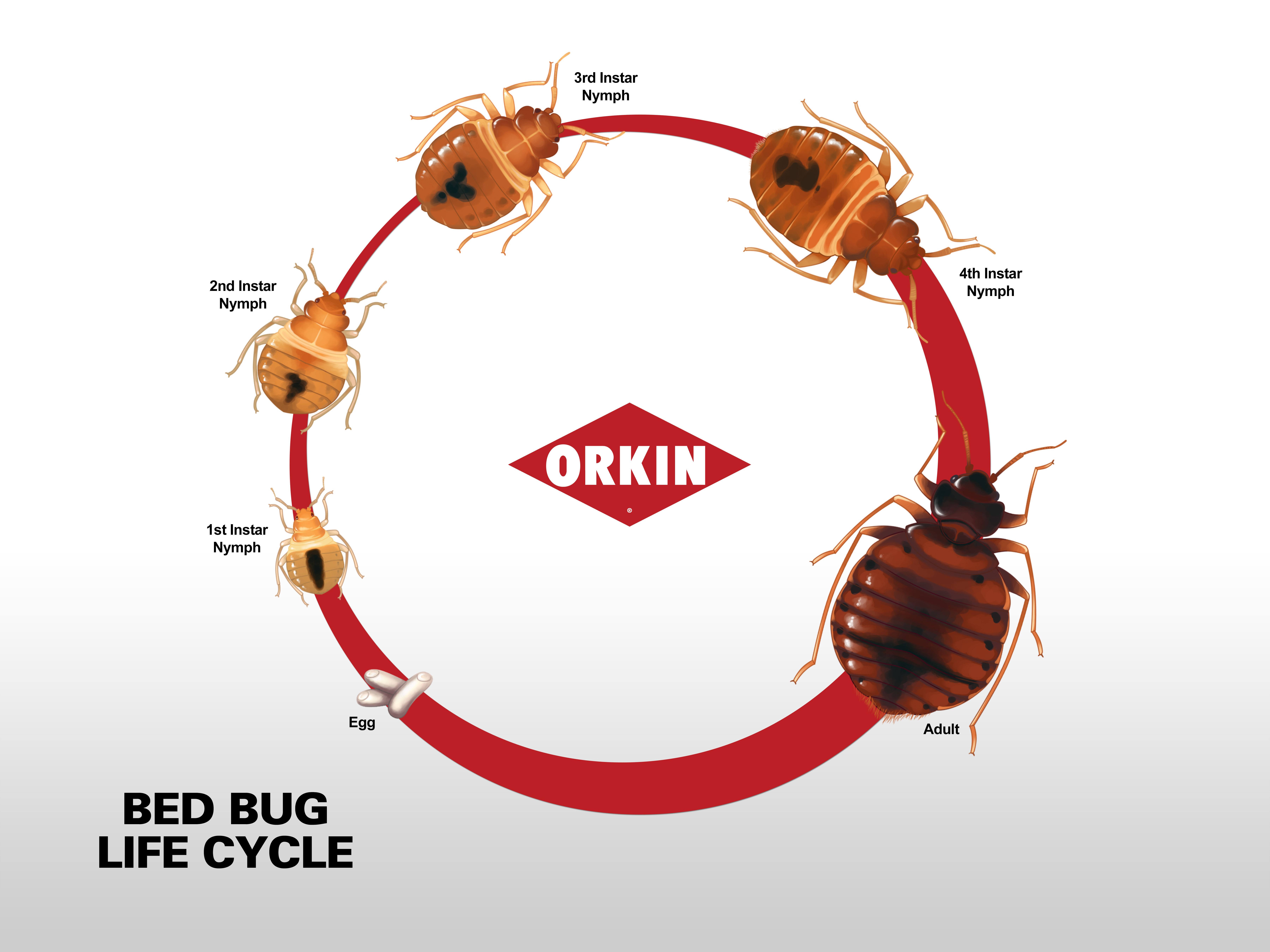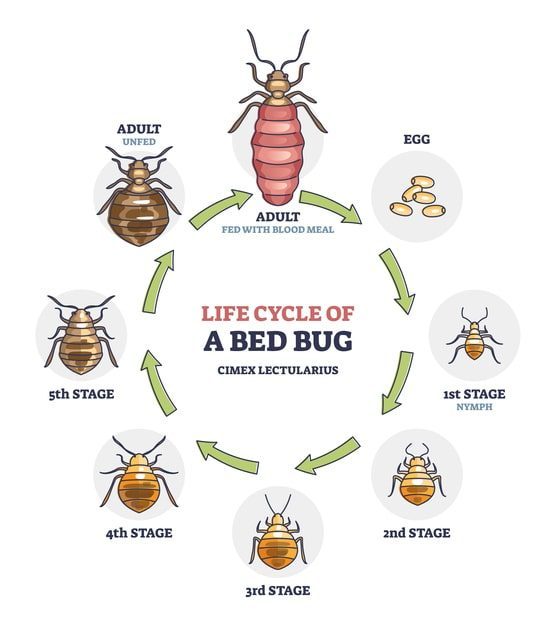Bed bugs can multiply rapidly, with one female laying up to 500 eggs in her lifetime. It takes around 21 days for bed bug eggs to hatch, and nymphs can mature in about 5 weeks.
Bed bugs are notorious for their rapid reproduction rate. These tiny pests can quickly infest an area as one female bed bug can lay hundreds of eggs, leading to a significant increase in population within a short period. Understanding the timeline of bed bug reproduction is essential for effective pest control and eradication strategies.
We will explore the factors influencing the multiplication of bed bugs and provide insights on how to prevent and manage infestations.

Credit: www.orkin.com
Life Cycle Of Bed Bugs
Bed bugs can multiply rapidly, with a female laying up to 500 eggs in her lifetime. The entire life cycle, from egg to adult, can take anywhere from 2 to 4 months, depending on factors such as temperature and availability of food.
This rapid reproduction is why prompt action is crucial to control infestations.
Egg Stage
Female bed bugs lay 1-5 eggs per day, totaling up to 200-500 eggs in their lifetime.
Eggs are white and tiny, about the size of a pinhead, and are usually deposited in cracks and crevices.
Nymph Stage
Once hatched, nymphs feed on blood and molt five times before reaching adulthood.
Nymphs are opaque and lighter in color after molting, gradually becoming reddish-brown.
Adult Stage
Adult bed bugs start reproducing after reaching maturity at around 5 weeks.
They can live up to 6-12 months, during which time they can produce multiple generations.
Key Points: – Bed bugs multiply rapidly due to their short reproductive cycle. – The entire life cycle from egg to adult can take approximately 1-2 months. – Effective bed bug control includes targeting eggs, nymphs, and adults to prevent infestations.Remember: Regular inspection and early intervention are key to preventing bed bug infestations.Factors Affecting Bed Bug Reproduction
Temperature
Optimal temperatures ranging from 70-80°F accelerate bed bug reproduction.
Extreme temperatures below 50°F or above 98°F can inhibit breeding.
Feeding
Regular blood meals are essential for bed bugs to reproduce efficiently.
Consistent feeding promotes growth of nymphs into adults for breeding.
Availability Of Mates
- Multiple mating partners increase the chance of successful reproduction.
- Limited access to mates can slow down the bed bug multiplication rate.
Effective Bed Bug Control And Prevention
Regular inspection, professional treatment, and cleaning and sanitizing are key steps in effective bed bug control and prevention.
Regular Inspection
Regular inspection plays a crucial role in preventing bed bug infestations from multiplying and spreading. Bed bugs are skilled at hiding in various areas, including mattresses, bed frames, furniture, and cracks in walls or floors. By conducting regular inspections, you can identify any early signs of bed bugs and take timely action to control them before they have a chance to multiply and become a larger problem.
Professional Treatment
When faced with a bed bug infestation, it’s important to seek professional treatment. Professional pest control experts have the knowledge, experience, and tools required to effectively eliminate bed bugs from your home or business. They can provide targeted treatments that target the source of the infestation and prevent further multiplication of bed bugs.
Cleaning And Sanitizing
Cleaning and sanitizing your living space is an essential part of bed bug prevention. Bed bugs are attracted to dirt, clutter, and debris, so keeping your surroundings clean and organized can help deter them from settling in. Regularly vacuuming carpets, washing bedding in hot water, and maintaining a clutter-free environment can significantly reduce the likelihood of a bed bug infestation. Additionally, using mattress and pillow encasements can create a physical barrier that prevents bed bugs from breeding and multiplying.

Credit: budgetbrotherstermite.com

Credit: www.bedbugsnorthwest.com
Frequently Asked Questions Of How Long Does It Take For Bed Bugs To Multiply?
How Fast Do Bed Bugs Multiply?
Bed bugs can multiply rapidly, with a female laying up to 5 eggs per day. Under optimal conditions, they can grow from egg to adult in just a month.
How Long Does It Take For Bed Bugs To Infest A Home?
A bed bug infestation can begin with just a few bugs and grow quickly. They can multiply rapidly, and it only takes a few months for a small infestation to become a large problem.
What Factors Affect The Rate Of Bed Bug Multiplication?
Temperature, availability of blood meals, and hiding places can all impact how quickly bed bugs multiply. Warmer temperatures and access to blood can lead to faster multiplication.
Can Bed Bugs Multiply Without Feeding?
While bed bugs can survive for several months without a blood meal, they cannot reproduce without one. A blood meal is necessary for their eggs to develop.
Conclusion
So, how long does it take for bed bugs to multiply? The answer lies in their rapid reproductive ability. With a female bed bug capable of laying up to 5 eggs per day and an average lifespan of 6-12 months, infestations can quickly escalate.
Early detection and proactive measures are crucial to preventing bed bug populations from multiplying exponentially. By implementing effective pest control strategies and maintaining proper hygiene, you can effectively manage and control bed bug infestations. Stay vigilant, and act swiftly when addressing potential bed bug issues to keep your home bug-free and ensure a sound sleep environment.

I’m MD Tanvir, and I bring years of expertise gained from working closely with pest control companies to the forefront. My journey in the industry has inspired me to launch Bug Battler, a platform aimed at equipping people with the know-how to combat pests autonomously. Through Bug Battler, I aim to empower individuals with practical insights to tackle pest infestations effectively.

